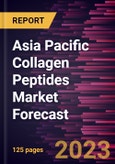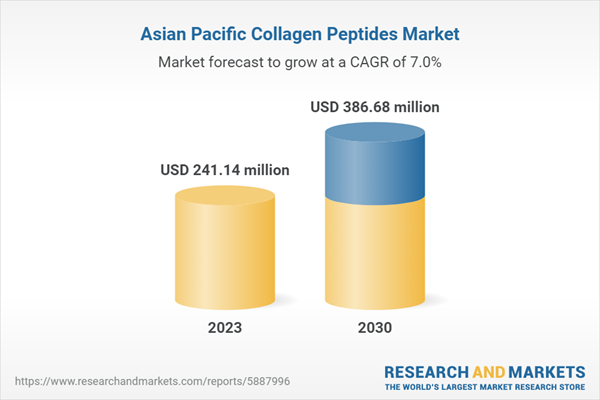Escalating Trend of Using Collagen Peptides in Personal Care and Nutricosmetics is Fuels Asia Pacific collagen peptides market
The beauty & personal care industry is growing at a significant pace. Asia Pacific, North America, and Europe are major beauty and personal care product markets. People focus more on skincare and hair care and procure products that provide nourishment and deep hydration. Moreover, they prefer products that offer anti-aging benefits. As humans age, the body produces less collagen, creating skin problems such as wrinkles, skin loosening, and dehydration.Alcohol consumption, smoking, and stress also trigger skin aging. Collagen peptides assist in improving skin health and slowing down the aging process. Primarily collagen peptide is used in various personal care and cosmetic products, including moisturizers, anti-aging creams and lotions, acne-fighting gels, shampoos, and hair serums. When used in hair care products, collagen peptide improves the appearance of hair and enhances hair strength. It also aids in improving the texture of hair generally damaged by excessive chemical treatments or underlying health issues. Skincare products with collagen peptides improve the appearance of damaged or dry skin by reducing flaking and restoring suppleness.
Consumers focus on holistic beauty, which blurs the lines between beauty, health, and well-being. People strongly believe that having beautiful skin necessitates a healthy lifestyle. Consumers are increasingly opting for healthier ways to make their skin glow, as they have traced a link between healthy skin and a balanced diet. Therefore, over the past few years, there has been a growing demand for nutricosmetics. Nutricosmetics are products or ingredients that act as nutritional supplements for skin, nails, and hair care.
They are usually offered in liquids, pills, or functional foods. With the increasing consumption, manufacturers are launching various nutricosmetics. Thus, the escalating demand for collagen peptides in personal care products and nutricosmetics is expected to introduce new trends to the collagen peptides market during the forecast period.
Asia Pacific Collagen Peptides Market Overview
The collagen peptides market in Asia Pacific is subsegmental into Australia, China, India, Japan, South Korea, and the Rest of Asia Pacific. Emerging economies, including India, China, and South Korea, are witnessing a surge in health-conscious consumers as a result of the impact of social media. Growing demand for nutritional supplements and increasing use of collagen peptides in personal and sports nutrition products are driving the collagen peptides market in Asia Pacific. Functional food and beverages have gained immense popularity among the health-conscious population. Due to high nutritional values and economic feasibility, collagen peptides allow food, beverage, and dietary supplement companies to meet the market's insatiable targets of protein supplementation.Collagen peptides is gaining popularity as a nutricosmetic component in Asia Pacific. As a result, collagen-enriched face masks and other cosmetic products are becoming a skincare trend in the region. Amino Collagen India is a major player in the Indian beauty supplement market, operating under the Meiji Amino Collagen brand. The key players in the market are taking initiatives to expand their business and cater to the growing demand for collagen peptides in various applications. For instance, in January 2023, Youtheory - a Southern California-based supplement brand - announced the expansion of its collagen-based Beauty On-The-Go Product in Japan. In addition, "beauty restaurants" have started appearing in, such as Singapore and Japan, offering a variety of delicacies containing dietary supplements, many of which are collagen peptide-based food preparations. Thus, the growing popularity of collagen peptides as an ingredient in nutricosmetic products is expected to drive the collagen peptides market in Asia Pacific in the coming years.
Asia Pacific Collagen Peptides Market Revenue and Forecast to 2030 (US$ Million)
Asia Pacific Collagen Peptides Market Segmentation
The Asia Pacific collagen peptides market is segmented into source, form, application, and country.Based on source, the Asia Pacific collagen peptides market is segmented into bovine, porcine, poultry, marine, and others. The bovine segment registered the largest Asia Pacific collagen peptides market share in 2023.
Based on form, the market is segmented into dry and liquid. The dry segment held a larger Asia Pacific collagen peptides market share in 2023.
Based on application, the Asia Pacific collagen peptide market is segmented into food & beverages, pharmaceuticals & nutraceuticals, personal care, and others. The pharmaceuticals & nutraceuticals segment held the largest Asia Pacific collagen peptide market share in 2023.
Based on country, the Asia Pacific collagen peptide market is segmented into Australia, China, India, Japan, South Korea, and the Rest of Asia Pacific. the Rest of Asia Pacific dominated the Asia Pacific collagen peptide market share in 2023.
GELITA AG; Nippi Collagen NA Inc; Nitta Gelatin India Ltd; Rousselot BV; Tessenderlo Group NV; Titan Biotech Ltd; and Weishardt Holding SA are the leading companies operating in the collagen peptide market in the region.
Table of Contents
Companies Mentioned
- GELITA AG
- Nippi Collagen NA Inc
- Nitta Gelatin India Ltd
- Rousselot BV
- Tessenderlo Group NV
- Titan Biotech Ltd
- Weishardt Holding SA
Table Information
| Report Attribute | Details |
|---|---|
| No. of Pages | 125 |
| Published | August 2023 |
| Forecast Period | 2023 - 2030 |
| Estimated Market Value ( USD | $ 241.14 million |
| Forecasted Market Value ( USD | $ 386.68 million |
| Compound Annual Growth Rate | 7.0% |
| Regions Covered | Asia Pacific |
| No. of Companies Mentioned | 7 |









